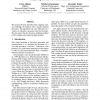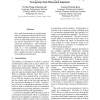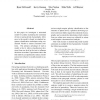ACL
2004
14 years 29 days ago
2004
This paper shows how finite approximations of long distance dependency (LDD) resolution can be obtained automatically for wide-coverage, robust, probabilistic Lexical-Functional G...
ACL
2004
14 years 29 days ago
2004
We describe two probabilistic models for unsupervised word-sense disambiguation using parallel corpora. The first model, which we call the Sense model, builds on the work of Diab ...
ACL
2004
14 years 29 days ago
2004
This paper describes an empirical study of the "Information Synthesis" task, defined as the process of (given a complex information need) extracting, organizing and inte...
ACL
2004
14 years 29 days ago
2004
Sentiment classification is the task of labeling a review document according to the polarity of its prevailing opinion (favorable or unfavorable). In approaching this problem, a m...
ACL
2004
14 years 29 days ago
2004
We present the first algorithm that computes optimal orderings of sentences into a locally coherent discourse. The algorithm runs very efficiently on a variety of coherence measur...
ACL
2004
14 years 29 days ago
2004
We present the results of an experiment on extending the automatic method of Machine Translation evaluation BLUE with statistical weights for lexical items, such as tf.idf scores....
ACL
2007
14 years 1 months ago
2007
On a multi-dimensional text categorization task, we compare the effectiveness of a feature based approach with the use of a stateof-the-art sequential learning technique that has ...
ACL
2007
14 years 1 months ago
2007
We examine the effect of contextual and acoustic cues in the disambiguation of three discourse-pragmatic functions of the word okay. Results of a perception study show that contex...
ACL
2007
14 years 1 months ago
2007
We describe an algorithm for a novel task: disambiguating the pronoun you in conversation. You can be generic or referential; finding referential you is important for tasks such ...
ACL
2007
14 years 1 months ago
2007
In this paper we investigate a structured model for jointly classifying the sentiment of text at varying levels of granularity. Inference in the model is based on standard sequenc...



